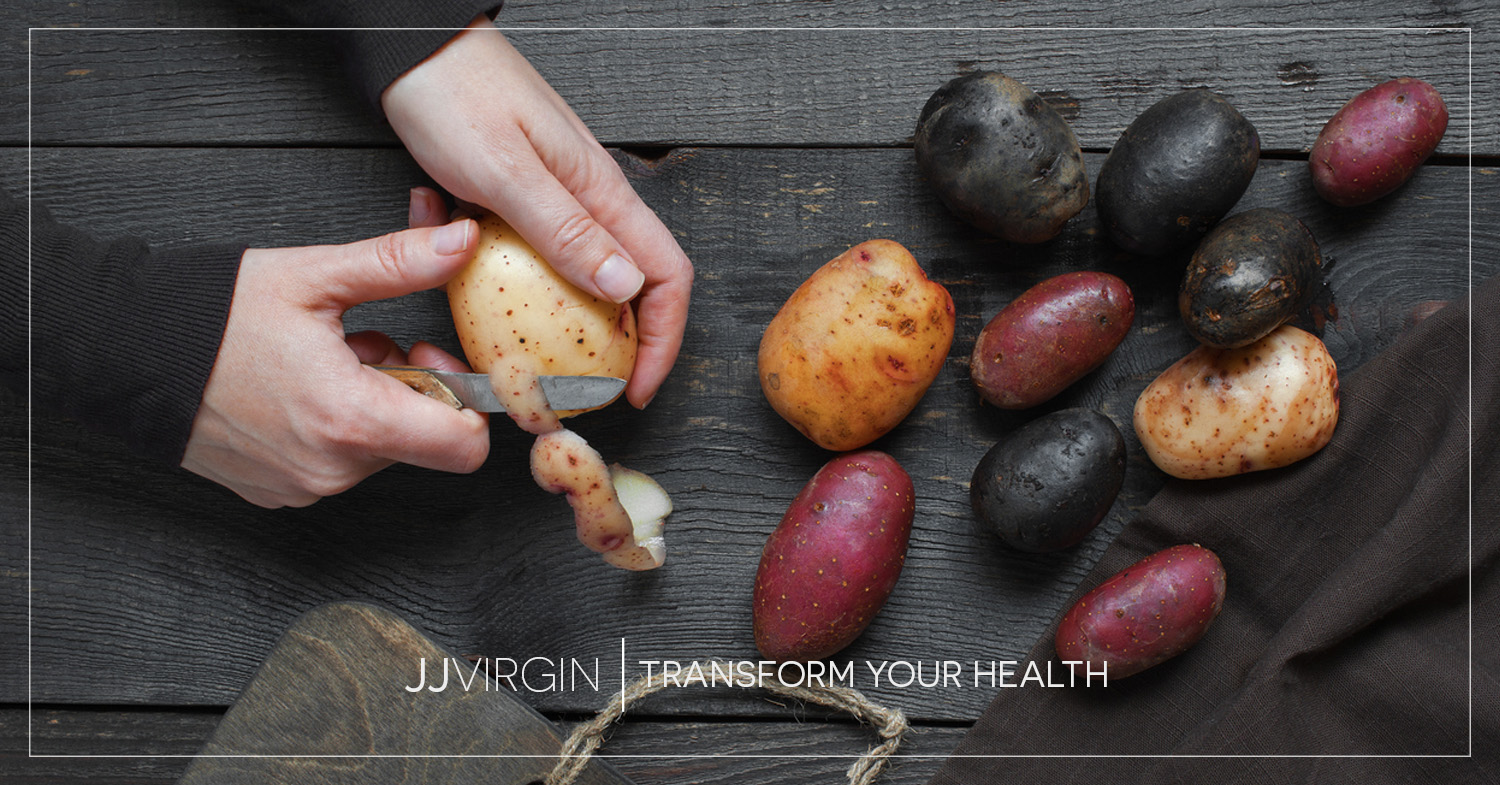During the low-carb craze, potatoes became Public Food Enemy #1.
And I was in full agreement. For years, I’ve been telling people not to eat potatoes because they were high-sugar impact, destined to spike your blood sugar and cause inflammation.
However, new research is piling up about something called “resistant starch” (more on that later) which shows that potatoes are much more nutritious than we ever thought! Turns out spuds aren’t such villains after all…
This is why I love science! We’re always learning something new, and I believe it’s only right to change my advice when studies reveal new facts.
That’s why I’m walking back my past opinion of potatoes – in fact, I’ve revised them to medium-sugar impact status. It’s time to put this much-maligned veggie back on your plate!
There’s lots of confusing, misleading information out there. I wrote my Ultimate Health Roadmap to cut through the confusion and provide short, actionable steps you can take to lose weight, feel better, and dial up your health. Grab your FREE guide here.
Not All Carbs Are the Enemy
Let’s start with one key fact: despite their negative reputation, carbohydrates are actually an important part of your diet. But it’s key to choose the right ones!
Carbs with fiber and resistant starch like potatoes provide a host of health benefits, from helping you burn fat and fight disease to improving your insulin sensitivity and boosting gut health. And the list doesn’t stop there!
Read on to find out about all the good potatoes have to offer…
- Potatoes are rich in resistant starch
If you haven’t heard of resistant starch before, it’s pretty much what it sounds like. Resistant starch is a type of carbohydrate that resists digestion in your small intestine.1 That means it doesn’t cause inflammation-inducing rises in blood glucose or insulin like simple carbs do.
And when it comes to losing weight, resistant starch is an amazing ally! Studies show that resistant starch intake can not only help boost fat loss and regulate blood sugar levels, it can also reduce the risk of obesity and type 2 diabetes!2,3
As if all that wasn’t enough, resistant starch is also great for your gut! Research proves that resistant starch feeds the friendly bacteria in your digestive tract and helps maintain a healthy balance of gut flora. (Wondering why that’s important? Check out this article to find out more…)
- Potatoes are loaded with vitamins and minerals
Believe it or not, potatoes are actually packed with nutrients!
They’re rich in multiple B vitamins and minerals like potassium, plus just one medium potato contains more than a quarter of your daily vitamin C needs.4 Don’t be fooled by its simple appearance – the humble potato is actually a superhero spud!
- Potatoes are inexpensive
Ever think it costs too much to eat healthy? Think again!
In a study of over 6,000 foods, potatoes were identified as one of the most affordable nutrient-rich options.5 At an average of 84 cents per pound, potatoes are a great choice when you’re looking to stretch your dollar!6
- Potatoes contain health-boosting phytonutrients
“Phytonutrients” is just a fancy term for the plant compounds that are especially good for you. And potatoes have a bunch of them!
Studies show that regularly eating vegetables and fruits with phytonutrients can help reduce your risk of major chronic illnesses like heart disease and cancer.7 (Read this blog for more anti-aging foods.)
- Potatoes are yummy
There’s no denying it: potatoes are delicious! Just be sure not to undo all the advantages of this incredible superfood by covering it with potentially inflammatory ingredients like sour cream and cheese.
Check out the tips below for the safest, healthiest ways to prep your potatoes…
No More French Fries
The potatoes you choose and how you cook them matters! Here’s some important tips…
- Never fry your spuds – no French fries, tater tots, or potato chips! Frying breaks down the resistant starch and leaves behind sugars.
- Baking your potatoes increases the amount of resistant starch, so this is a great option.8 I love them in this Sausage, Butternut, and Potato Bake!
- If you’re boiling potatoes, be sure to boil them in bone broth or veggie stock, and use that liquid as part of your meal so you don’t lose the vitamins released during boiling. (Here’s a fantastic recipe for Healthy Garlic Herb Mashed Potatoes using this method…)
- Baby potatoes are highest in resistant starch, and a variety of colors gives you more phytonutrients.
- Studies show that you get the best resistant starch benefits and lowest impact on your blood sugar when you eat your cooked potatoes cold! So if you bake or boil, then chill, you’ll get much better results than eating your potatoes hot.
Potatoes are a perfect example of why it’s so important to get your nutrition and health advice from experts who are willing to change their recommendations based on the latest science. It’s not about pride or false consistency, it’s about my team and I doing the best we can to help you optimize your health!
Just ONE sleep-deprived night can knock your stress hormones out of whack, making you more likely to gain weight and experience uncomfortable symptoms like mood swings and skin breakouts. Get the great sleep you deserve with my Best Rest Sleep Cheat Sheet. I’ve shared my best tips for stellar sleep. It’s FREE, so claim yours here.
References
1 https://academic.oup.com/advances/article/4/3/351S/4644810
2 https://www.sciencedirect.com/science/article/pii/S0895398815300301
3 https://academic.oup.com/advances/article/4/6/587/4595564
4 https://academic.oup.com/advances/article/4/3/384S/4591619
5 https://www.ncbi.nlm.nih.gov/pubmed/23714199
6 https://www.ams.usda.gov/mnreports/fvwretail.pdf
7 https://academic.oup.com/advances/article/4/3/384S/4591619
8 https://www.sciencedirect.com/science/article/pii/S0308814616305052
The views in this blog by JJ Virgin should never be used as a substitute for professional medical advice. Please work with a healthcare practitioner concerning any medical problem or concern. The information here is not intended to diagnose, treat, or prevent any disease or condition. Statements contained here have not been evaluated by the Food and Drug Administration.
*These statements have not been evaluated by the Food and Drug Administration. This product is not intended to diagnose, treat, cure, or prevent any disease.






